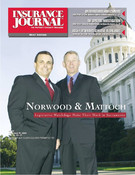Standard & Poor’s Ratings Services has revised its outlook on the U.S. property/casualty commercial lines sector to negative from stable.
“The outlook revision follows allegations of widespread misconduct in a civil complaint filed by the New York State Attorney General on Oct. 14, 2004,” explained S&P credit analyst John Iten. “Standard & Poor’s expects that this investigation will result in lower revenues and higher expenses for many insurers, casting doubt on prior expectations of ratings stability and ongoing improvement in profitability for the industry over the medium term.”
The complaint charged that Marsh & McLennan Cos. (BBB+/Watch Neg/A-2) and its brokerage subsidiary, Marsh Inc. (Marsh), the world’s largest insurance broker, engaged in bid rigging with the assistance of insurance companies that had entered into market service agreements with Marsh. The insurance companies allegedly provided noncompetitive quotes when asked to do so by Marsh to give the appearance of a fair and competitive bidding process for its clients’ business, when in fact Marsh had already decided which insurer would get the business. In return for their cooperation, the complaint asserts, the insurers expected to be compensated in the future by receiving other (noncompetitive) business.
The four insurers mentioned in the complaint–American International Group Inc. (AIG; AAA/Stable/A-1+), ACE Ltd. (BBB+/Stable/A-2), Hartford Financial Services Group Inc. (A-/Stable/A-2), and Munich American Risk Partners (not rated)–were not named as defendants. However, in a press conference, the Attorney General left little doubt that these and other insurance companies will be pulled into this investigation. He gave some indication of the breadth of the investigation by saying that it touched virtually all lines of insurance. Several insurers have acknowledged publicly that they are cooperating with the Attorney General’s investigation.
“Standard & Poor’s believes that this investigation will lead to lower revenues for many insurers,” Iten added. “Because the bid rigging inflated the premiums paid by insurance buyers, it is to be expected that the cessation of this behavior will lead to more competition and lower premium income for insurers, at least in the excess casualty business line.”
This will exacerbate the softening in market conditions that has already begun. On the positive side, insurers will no longer have to pay brokers contingent commissions under market services agreements, as this practice is swiftly being discontinued. However, S&P expects that the loss in premium income will outweigh any savings on contingent commissions, based on the assumption that the benefit to these arrangements must have exceeded the cost or else insurers would not have been willing to pay these commissions in the first place.
The cost of complying with the Attorney General’s requests for information and contesting any charges is likely to become a significant expense for many companies over the next several months. Making matters worse, other state and federal officials are or soon will be conducting their own investigations into the same practices. Senior managers and their staffs will be forced to spend a large amount of time responding to these requests for information.
With senior management’s attention diverted, there is the potential for companies to lose their underwriting focus just as the industry pricing cycle is turning downward. Over the longer term, the entire insurance industry will have to absorb the cost of complying with additional regulatory oversight measures that will likely be put in place to prevent future misconduct.
For companies that are publicly named in these investigations, the costs would include legal bills for defending themselves against any lawsuits brought by the Attorney General or other regulators as well as the cost of any fines or penalties. S&P believes that prior investigations by the Attorney General into the mutual fund and investment banking industries could provide a reasonable indication of how insurers could be affected. For insurance companies implicated, there would likely be settlement discussions that result in fines and agreements to change business practices to prevent abusive practices from recurring. The size of the fines would vary depending on how large the company is and the amount of incriminating evidence the authorities have, but the fines would likely be substantial. There would also be the cost of defending and settling any class action lawsuits brought against the companies by policyholders or shareholders.
In addition, there will almost certainly be organizational turmoil as executives at companies being investigated either leave voluntarily or are forced out. Mid-level managers at two major insurers–AIG and ACE–have already pleaded guilty to criminal charges and are cooperating with the New York Attorney General. Similar developments at other insurance companies can be expected.
Despite these concerns, S&P has not taken any rating actions on specific insurers at this time because it is not yet possible to assess the potential impact of these developments. Nevertheless, S&P anticipates that rating actions on insurers will occur as more information becomes available. Furthermore, S&P has taken rating actions on several insurance brokers, and further rating actions on the brokers are likely.
Topics Trends Carriers Agencies Property Property Casualty Casualty
Was this article valuable?
Here are more articles you may enjoy.


 Zurich Insurance Said to Near Beazley Deal Funded by Equity Sale
Zurich Insurance Said to Near Beazley Deal Funded by Equity Sale  Commercial P/C Market Softest Since 2017, Says CIAB
Commercial P/C Market Softest Since 2017, Says CIAB  Sompo Holdings Completes Acquisition of Aspen, Taking it Private
Sompo Holdings Completes Acquisition of Aspen, Taking it Private  AI Lost Out to Traditional Models in Forecasting NYC’s Blizzard
AI Lost Out to Traditional Models in Forecasting NYC’s Blizzard 


